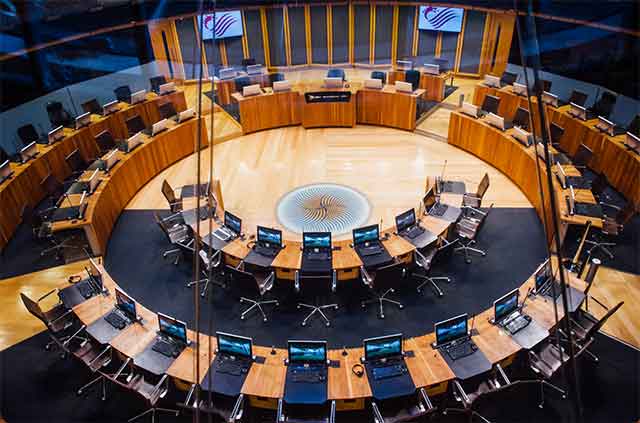Human rights experts called for a ban on the “traumatising” use of Tasers against children by police, warning the “unacceptable” use of force runs contrary to children’s rights.
Rhian Croke, of the Children’s Legal Centre Wales, said mounting evidence shows systemic discrimination – with black, disabled and poorer children more likely to be the target.
Dr Croke expressed concerns about the UK Government potentially authorising the use, including on children, of Taser 10 – a new “more powerful” model – in the weeks ahead.
She warned of increased risks of physical harm and psychological trauma, with children describing Tasers as frightening, painful and traumatising – even when not discharged.
Nearly a quarter of recorded Taser use on children in Wales and England involved black boys aged between 11 and 17, according to a briefing for Senedd members.
‘Wales can and must do better’
Children with mental health conditions or additional learning needs and those from poorer backgrounds were also found to be disproportionately affected.
In 2023, a United Nations committee called for a ban on the use of Tasers on under 18s, warning of potential breaches of the UN Convention on the Rights of the Child (UNCRC).
“The decision to authorise Taser 10 will impact children in Wales,” wrote Dr Croke. “Wales can and must do better. Despite policing not being devolved, Wales is a children’s rights, trauma-informed, and anti-racist nation.”
Urging the Welsh Government to lead calls for a pause on Taser 10, Dr Croke called for a wider ban on Taser use against children or at least a strong legal presumption against.
Police in Wales and England deployed Tasers on children 2,900 times last year, including five instances against children under 11, with 66 discharges – all on those aged 11 to 17.
‘He flopped on the floor’
Wales’ four police forces used Tasers on children 112 times and fired on three occasions, according to the Home Office statistics for 2023/24.
South Wales Police pulled Tasers on children the most (56 times) followed by Gwent (35, including two discharges), North Wales (12, one discharge) and Dyfed Powys (nine).
Dr Croke pointed to research showing Taser use – or the threat of it – causes significant distress, fear and trauma in children. Some children reported experiencing symptoms of post-traumatic stress disorder following such an encounter with police.
One child told researchers: “I just saw the little dot there and… I just went all warm, scared. I thought I’m going to get hurt now, I’m going to get a shock in a minute. They just stunned him [his friend] and he flopped on the floor.”
In the briefing, jointly prepared with Louise King from the Children’s Rights Alliance England, Dr Croke warned Tasers also pose a major risk to children’s physical health.
‘State-inflicted violence’
The researchers wrote: “Unlike earlier models, Taser 10 barbs must embed in the skin. Children’s thinner skin and reduced body wall-to-organ distance significantly heighten the risk of deep tissue or organ injury.
“Barbs from Taser 10 are heavier, travel at higher velocity and have increased kinetic energy, increasing the likelihood of severe internal harm, including to the eyes, brain, lungs and liver. Given that children frequently wear lighter clothing, this danger is compounded.”
Warning no child rights impact assessment had been published on Taser 10, Dr Croke argued such assessments should be mandatory for all new policing technology.
She said: “Taser use, which includes threatening a child with a Taser, can constitute a form of state-inflicted violence, especially in cases where the child poses no serious threat.
“This is particularly concerning when used on children already traumatised by abuse, exploitation or neglect. Taser use may re-traumatise children.”
‘Alarmed’
Jenny Rathbone and Buffy Williams, who chair the Senedd’s equality and children’s committees respectively, were similarly concerned about the impact on children’s rights.
In a joint letter, the Labour Senedd members wrote: “We are sufficiently alarmed at the impact… including the potential psychological and physical harm to children that these weapons can inflict, that we felt it necessary to signal our concerns immediately.”
The pair questioned how sanctioning the use of Taser 10 on children would be consistent with Welsh law which places a duty on ministers to have “due regard” to the UNCRC.
Dr Croke had pointed to a mismatch on policy between Wales and Westminster, drawing a parallel with concerns about children being strip-searched by police.
She said: “Taser use against children is a further example of how UK Government policy is contrary to Welsh Government’s commitment to the UNCRC and Welsh-specific legislation.”
‘Grave oversight’
Ms Rathbone and Ms Williams also echoed concerns about a lack of disaggregated data on the “disproportionate and discriminatory” use of Tasers against children in Wales.
In her response, Jane Hutt stated the Welsh Government does not want to see the use of tasers on children by police forces but responsibility remains with Westminster.
Wales’ social justice secretary said she would write to Labour colleague Diana Johnson, the UK policing minister, expressing concerns and seeking assurances.
Concluding her briefing, Dr Croke told Senedd members: “The continued use of Tasers and the deployment of Taser 10 on children by police… if authorised, will represent a serious breach of international human rights standards and Welsh children’s rights legislation.
“The UK Government’s failure to conduct a child rights impact assessment prior to authorisation is a grave oversight that disregards its obligations under the UNCRC.”

